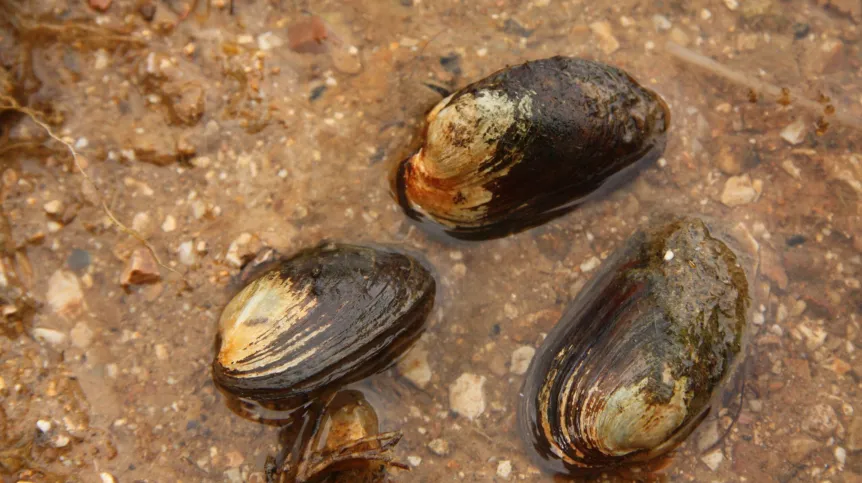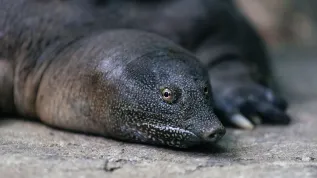
Mussels are extraordinary organisms that have dominated aquatic ecosystems for millions of years - from the depths of the oceans to the sources of streams. They are long-lived, with some species living for hundreds of years. Despite this, their numbers have been decreasing drastically in recent decades. New research by Polish scientists - Tadeusz Zając, PhD, and Katarzyna Zając, PhD, professors at the Institute of Nature Conservation of the Polish Academy of Sciences - sheds light on the causes of this phenomenon.
Their latest publication in Scientific Reports (https://doi.org/10.1038/s41598-025-91926-9) concerns the reproduction and mortality of mussels from the Unionidae (river mussels) family, whose larvae are periodic parasites of freshwater fish.
'Freshwater mussels are among the most endangered groups of animals in the world, but the factors causing the decline in their numbers are still poorly understood', Tadeusz Zając says in an interview with PAP.
Scientists from the Institute of Nature Conservation PAS analysed the life history of several hundred mussels of the endangered species Unio crassus in four Polish rivers and noticed that they had extremely flexible spawning dates - sometimes they would start spawning at the end of winter, sometimes only at the beginning of August. However, the vast majority begin spawning when the water temperature exceeds 5 degrees Celsius.
'Of course, those that start spawning at the earliest point have the longest spawning period and can produce the most clutches - up to seven during the season. It would seem that the sooner it gets warmer, the greater their reproductive success will be. But this is not the case at all. Because warming affects not only early spring, but also summer. And too high temperatures in summer, i.e. at the peak of the spawning season, increase the mortality of mussels and cause them to produce fewer young', the expert explains.
What is the reason for this? According to Zając, the availability of food and water temperature are crucial. Hot summers cause many mussels to die, and those that survive must put almost all their energy into protecting themselves against the temperature and various types of pathogens (e.g. bacteria and flukes), which are much more abundant in warm water. 'They use up practically all their energy on this, and they cannot replenish their reserves, because they are filter feeders dependent on what is suspended in the water column. They cannot eat when necessary. Therefore, there are no more resources for reproduction and they have to give it up', the expert says.
'Despite the fact that spawning starts earlier, at too high temperatures it also ends much earlier. When this repeats itself every year, the mussels lose dozens of generations of offspring', he emphasises.
He adds that the phenomenon of mussel extinction is observed throughout Europe. It only spares colder rivers, such as the San, where mussels can still spawn five or six times per year and there is no increase in their mortality. In the other rivers the researcher analysed, mussels increasingly spawn one or two times clutches per season. This leads to a situation where there are not enough young mussels to guarantee the replacement of dying individuals with new ones.
"'In short - increased temperatures can act like a clock limiting the time for reproduction', Zając sums up.
He added that currently there is not a single large mussel in Europe that is not affected by the declining numbers. 'It is also a big problem in the seas, and not only an ecological one, but also economic, decimating mussel farms and causing large financial losses', he says.
'I remember from my childhood walking on the banks of a river and literally tripping over mussels and cutting my feet on them. There were as many as 1,000-1,500 river mussels per running meter of the river. And now they are the most endangered; some people only know them from photos', he reminds.
Urgent actions are therefore needed to protect this group of animals, and the key in this is the protection of habitats and counteracting the effects of climate change, e.g. by calming the flow of water in rivers or reducing pollution. The biologist also draws attention to the problem of cutting down forests and shrubs along rivers, which causes them to heat up more. Stopping this practice would lower the local water temperature and promote the survival of mussels.
An additional option would be to relocate these animals to places with more optimal conditions for them, such as rivers fed by underground water, ones or with natural cooling mechanisms. However, according to the scientist, the real implementation of such methods on a large scale is difficult.
Despite the described threats, Zając remains moderately optimistic. 'Mussels are incredibly plastic organisms that can adapt to new conditions. And although they will probably not die out completely, in certain places in the world they definitely will. We must do everything to preserve as many of them as possible, because only then will they have a chance for evolutionary adaptation to the new reality', he concludes.
PAP - Science in Poland, Katarzyna Czechowicz (PAP)
kap/ agt/













